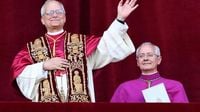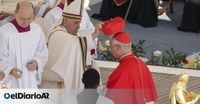Pope Francis, born Jorge Mario Bergoglio, passed away on April 21, 2025, at the age of 88, leaving behind a significant legacy and a series of challenges for his successor, Robert Francis Prevost, who has taken the name Pope Leo XIV. The new Pope, elected on May 8, 2025, during a conclave at the Vatican, is expected to continue the transformative initiatives set forth by his predecessor.
During his twelve years of papacy, Pope Francis made substantial reforms within the Catholic Church, focusing on issues such as financial transparency, environmental stewardship, and social justice. He was known for his strong advocacy for the marginalized, including the poor and migrants. His commitment to zero tolerance for sexual abuse and the protection of minors also marked a significant shift in the Church's approach to these critical issues.
In his first address as Pope Leo XIV, Prevost acknowledged the influence of Francis, stating, "We still hear that faint but always brave voice of Pope Francis blessing in Rome. Thank you, Francis," emphasizing the continuity of Francis's vision for an inclusive Church. Prevost's election marks a historic moment as he becomes the first American Pope, a milestone that reflects the global nature of the Catholic Church today.
Prevost, who served as the bishop of Chiclayo, Peru, was appointed by Francis as the Prefect of the Dicastery for Bishops in 2023, where he played a crucial role in selecting bishops. Of the 133 cardinals who participated in the election, 108 were appointed during Francis's papacy, indicating a strong alignment with the previous leadership's values.
Notably, Prevost has expressed his commitment to continue advocating for the Church's social teachings, particularly in relation to environmental issues and human rights. He has previously criticized the immigration policies of former President Donald Trump, echoing sentiments expressed by Francis regarding the need for compassion and understanding towards immigrants. In his first public message, Prevost said, "Peace be with you all, sisters and brothers. Help us build bridges," reinforcing his dedication to fostering dialogue and inclusivity.
As the Church looks to the future, Prevost faces several immediate decisions, including whether to proceed with a planned trip to Turkey for the 1700th anniversary of the Council of Nicaea, a journey that Francis had long desired to undertake. Preparations for this trip were already in motion, with the Vatican conducting inspections and logistics, but it will ultimately be up to Prevost to confirm the details.
While many within the Church support Prevost's alignment with Francis's reforms, there are factions that oppose certain innovations, particularly regarding family pastoral care and the blessing of same-sex couples. Some cardinals have openly expressed their desire to revert to more traditional stances, indicating that Prevost will need to navigate these internal challenges carefully.
In the wake of Francis's death, Nostradamus's predictions have resurfaced, with some interpreting his writings as foretelling significant changes within the papacy. According to interpretations of Nostradamus, the death of an elderly pontiff would lead to the election of a new leader who might weaken the papal seat. The notion of a "Black Pope" has also emerged, suggesting that the next pontiff could herald turbulent times ahead.
The conclave to elect the new Pope began on May 7, 2025, with cardinals gathering in the Sistine Chapel to deliberate. The election process is steeped in tradition, with the iconic white smoke signaling the selection of a new leader. As the Church enters this new chapter, many are eager to see how Prevost will address the ongoing issues and continue the work initiated by Francis.
Pope Francis's papacy was marked by a commitment to social justice, environmental issues, and a push for inclusivity within the Church. His initiatives aimed to bring the Church closer to the realities faced by contemporary society, emphasizing the importance of dialogue and understanding among different faiths and communities. The legacy he leaves behind is a complex tapestry of achievements and unresolved challenges, which Prevost must now navigate.
As the world watches, the new Pope's approach to these issues will be critical in shaping the future of the Catholic Church. His first steps will likely set the tone for his papacy and signal whether he will maintain the momentum of reform or chart a different course. The coming months will be pivotal as he addresses both the hopes and concerns of the global Catholic community.
The Church stands at a crossroads, with the potential for significant transformation under Prevost's leadership. With his background and previous roles, he is well-positioned to continue advocating for the values that Pope Francis championed, while also addressing the concerns of those who seek to uphold more traditional practices. As the faithful await the new Pope's decisions, one thing is clear: the legacy of Pope Francis will continue to influence the direction of the Church for years to come.


